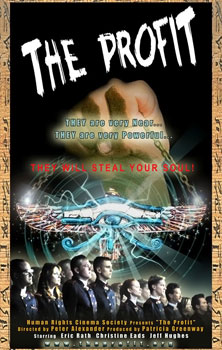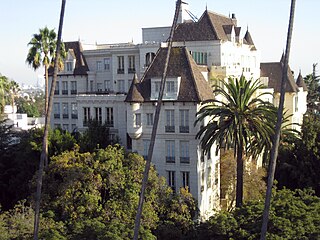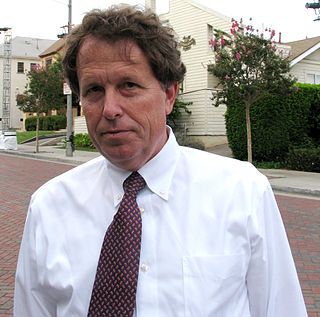| Part of a series on |
| Scientology |
|---|
 |
|
| Controversies |
| More |
Scientology has been subjected to considerable regulation in Russia including having books prohibited, and branches forcibly closed.
| Part of a series on |
| Scientology |
|---|
 |
|
| Controversies |
| More |
Scientology has been subjected to considerable regulation in Russia including having books prohibited, and branches forcibly closed.
In April 2007, the European Court of Human Rights ruled against Russia for repeatedly refusing to consider the Moscow Church of Scientology's application for the status of a legally valid religious association. The court found that the reasons given to deny re-registration of the church by the justice department and endorsed by the Moscow courts had no legal basis. [1] [2]
In July 2007, the St. Petersburg City Court ordered that the city's Scientology center be closed for violating its charter by engaging in unlicensed health care services. [3] A court in Samara came to a similar decision in November 2008, closing down the activities of the local center for practicing without a license. [4]
In September 2009, the European Court of Human Rights issued a binding ruling in favor of two Scientology branches in Surgut and Nizhnekamsk, which had been denied registration as "religious organizations." [5] The two organizations were awarded 20,000 € in costs and damages. [5] The ruling, which cannot be appealed, said that Russia could not ban the Church of Scientology simply because it did not have a long history in the country. [5]
In December 2009, the court closed the Dianetics Center in Naberezhnye Chelny. [6]
In 2010, some of the works of L. Ron Hubbard were included into Russia's Federal List of banned extremist materials, [7] and removed on 3 May 2011. [8] Another such attempt was made by prosecutor in mid-2011 and was unsuccessful. [9]
In November 2015, the activities of the Church of Scientology Moscow were banned by the Moscow city court, an action which was supported by the Supreme Court in June 2016. Two reasons stand for this lengthened struggle between the Church of Scientology and the Russian ministry of justice, first is that the Russian Orthodox Church views CoS as a "destructive organization." The ROC is split between two contradicting opinions, first that "Scientology is a dangerous heretical sect," and the others say it is not a religion and is "purely commercial." One reason for this position is that the Church of Scientology's name is a United States Trademark and therefore cannot be religious. [10] [ better source needed ]
In 2016 and 2019, police raided the Moscow and St. Petersburg branches and made several arrests. [11]
In June 2017, leaders of the Church of Scientology in St. Petersburg were arrested, charged with "participation in an 'extremist' community, incitement of hatred, and illegal business activities." According to Falikov, the accusations have no real basis. As for the accusations of illegal business activities, the Church of Scientology is made up of two branches, one a religious community "with no right to carry on a commercial activity, and the other a commercial branch, which sells books," Falikov writes. He calls the accusations an "instrument of suppression." He also mentioned that those arrested won a case against the European Court when their church branch was banned. [10] [ better source needed ]
In September 2018, the United States Commission on International Religious Freedom adopted the case of imprisoned Russian Scientologist Ivan Matsitsky, calling him a "prisoner of conscience." Matsitsky had been imprisoned on June 5, 2017, after a raid on a Church of Scientology in St. Petersburg. Matsitsky's case was adopted along with that of another religious worker imprisoned in Russia, Jehovah's Witness Dennis Christensen. On their imprisonment, Vice Chair of the USCIRF Kristina Arriaga stated, "These two cases are examples of the Russian government 'securitizing' religion—targeting religious communities it considers illegitimate on the pretext that they pose a national security threat." [12]
In 2021, Russia labelled World Institute of Scientology Enterprises and Church of Spiritual Technology "undesirable organizations" after finding that they "pose a threat to the security of the Russian Federation." [13]

The Church of Scientology has been involved in numerous court disputes across the world. In some cases, when the Church has initiated the dispute, questions have been raised as to its motives. The Church of Scientology says that its use of the legal system is necessary to protect its intellectual property and its right to freedom of religion. Critics say that most of the organization's legal claims are designed to harass those who criticize it and its manipulative business practices.

Since its inception in 1954, the Church of Scientology has been involved in a number of controversies, including its stance on psychiatry, Scientology's legitimacy as a religion, the Church's aggressive attitude in dealing with its perceived enemies and critics, allegations of mistreatment of members, and predatory financial practices; for example, the high cost of religious training:191 and perceived exploitative practices. When mainstream media outlets have reported alleged abuses, representatives of the church have tended to deny such allegations.

David Miscavige is an American Scientologist who is serving as the second and current leader of the Church of Scientology. His official title within the organization is Chairman of the Board of the Religious Technology Center. RTC is a corporation that controls the trademarks and copyrights of Dianetics and Scientology. He is also referred to within the Scientology organization as "DM", "COB", and "Captain of the Sea Org".

The term fair game is used to describe policies and practices carried out by the Church of Scientology towards people and groups it perceives as its enemies. Founder of Scientology L. Ron Hubbard established the policy in the 1950s in response to criticism both from within and outside his organization. Individuals or groups who are "fair game" are judged to be a threat to the Church and, according to the policy, can be punished and harassed using any and all means possible. In 1968, Hubbard officially canceled use of the term "fair game" because of negative public relations it caused, although the Church's aggressive response to criticism continued.

Scientology and its perspectives on sexual orientation are based on the writings of L. Ron Hubbard, the founder of the Church of Scientology. His statements about homosexuality have led critics to assert that Scientology promotes homophobia, though these allegations are disputed by some Scientologists.

World Institute of Scientology Enterprises (WISE) is a Church of Scientology organization headquartered in Los Angeles, California. It states that it is an "international membership organization whose members use both L. Ron Hubbard management technology and embrace the responsibilities and ethical standards of WISE membership."

The Church of Scientology is a group of interconnected corporate entities and other organizations devoted to the practice, administration and dissemination of Scientology, which is variously defined as a cult, a business, or a new religious movement. The movement has been the subject of a number of controversies, and the Church of Scientology has been described by government inquiries, international parliamentary bodies, scholars, law lords, and numerous superior court judgements as both a dangerous cult and a manipulative profit-making business.

The Church of Spiritual Technology (CST) is a California 501(c)(3) non-profit corporation, incorporated in 1982, which owns all the copyrights of the estate of L. Ron Hubbard and licenses their use. CST does business as L. Ron Hubbard Library. The Church of Spiritual Technology points to Hubbard as the “focal point,” with the structure designed to realize what Scientologists understand to be his vision. The stated purpose of the archive in CST, according to the church is “so that future generations will have available to them all of L. Ron Hubbard’s technology in its exact and original form, no matter what happens to the society.”

This is a Timeline of Scientology and its forerunner Dianetics, particularly its foundation and development by author L. Ron Hubbard as well as general publications, articles, books and other milestones.

The Profit is a feature film written and directed by Peter N. Alexander. The film premiered at the Cannes Film Festival in France in 2001. Distribution of the film was prohibited by an American court order which was a result of a lawsuit brought by the Church of Scientology, although the filmmaker says that the film is not about Scientology. As a result, The Disinformation Book Of Lists and The Times have characterized The Profit as a banned film in the United States.
The Church of Scientology Moscow v Russia [2007] ECHR 258 is a European Court of Human Rights case, concerning Article 11 of the convention. In the case the European Court of Human Rights in Strasbourg condemned Moscow City Government's refusal to consider the Church of Scientology of Moscow for registration as a religious organisation, and as a result found that Russia had violated the rights of the Church of Scientology under Articles 11 when "read in the light of Article 9". Specifically, the Court determined that, in denying consideration of registration to the Church of Scientology of Moscow, the Moscow authorities "did not act in good faith and neglected their duty of neutrality and impartiality vis-à-vis the applicant's religious community". The Court also awarded the Church €10,000 in respect of non-pecuniary damage and €15,000 for costs and expenses.

Recognition of Scientology and the Church of Scientology varies from country to country with respect to state recognition for religious status, charitable status, or tax exempt status. Decisions are contingent upon the legal constructs of each individual country, and results are not uniform worldwide. For example, the absence of a clear definition for 'religion' or 'religious worship' has resulted in unresolved and uncertain status for Scientology in some countries.

Scientology is a set of beliefs and practices invented by the American author L. Ron Hubbard, and an associated movement. It is variously defined as a cult, a business, a religion, or a scam. Hubbard initially developed a set of ideas that he called Dianetics, which he represented as a form of therapy. An organization that he established in 1950 to promote it went bankrupt, and Hubbard lost the rights to his book Dianetics in 1952. He then recharacterized his ideas as a religion, likely for tax purposes, and renamed them Scientology. By 1954, he had regained the rights to Dianetics and founded the Church of Scientology, which remains the largest organization promoting Scientology. There are practitioners independent of the Church, in what is referred to as the Free Zone. Estimates put the number of Scientologists at under 40,000 worldwide.
The Constitution of Uzbekistan provides for freedom of religion and separation of church and state, although in practice this is not always the case. There is no restriction on mainstream religious practice by Muslims, Jews and Christians. Uzbek society is tolerant of Christian churches as long as they do not attempt to win converts among ethnic Uzbeks; the law prohibits or severely restricts proselytizing, importing and disseminating religious literature, and offering private religious instruction.
In Russia, freedom of religion is provided for in Chapter 1, Article 14, Chapter 2, Articles 28 and 29 of the 1993 constitution, which forbid the federal government from declaring a state or mandatory religion, permit the freedoms of conscience and profession of faith, and forbids state advocacy purporting superiority of any group over another on religious grounds. However, each of these provisions have been contrasted against a clause in Chapter 2, Article 55 that permits the federal government to restrict human rights where it is deemed necessary and under specific conditions. With these articles taken collectively, and as there is no explicit provision allowing for the automatic right of religious groups to exist as establishments, proselytize, or provide guidance, "religious freedom" as would be defined in other nations is not guaranteed.

The Church of Scientology has operated in Germany since 1970. German authorities estimate that there are 3,500 active Scientologists in Germany as of 2019. The Church of Scientology gives a membership figure of around 12,000. The Church of Scientology has encountered particular antagonism from the German press and government and occupies a precarious legal, social, and cultural position in Germany.

Scientology was founded in the United States by science fiction author L. Ron Hubbard and is now practiced in many other countries.

The Scientology movement has been present in Canada since at least the 1960s. According to the most recent available census data, there were 1,745 individuals in Canada identifying as Scientologists in 2011. Scientology has encountered difficulties in obtaining status as a tax exempt organization, as has happened in other countries.

Kendrick Lichty Moxon is an American Scientology official and an attorney with the law firm Moxon & Kobrin. He practices in Los Angeles, California, and is a lead counsel for the Church of Scientology. Moxon received a B.A. from American University in 1972, and a J.D. degree from George Mason University in 1981. He was admitted to the Washington, D.C., bar association in 1984, and the State Bar of California in 1987. Moxon's early work for the Church of Scientology involved legal affairs, and he also held the title of "reverend". He worked out of the Scientology intelligence agency known as the Guardian's Office (GO), and was named as an unindicted co-conspirator after the Federal Bureau of Investigation's investigation into criminal activities by Scientology operatives called "Operation Snow White". An evidence stipulation in the case signed by both parties stated he had provided false handwriting samples to the FBI; Moxon has since said that he did not "knowingly supply" false handwriting samples.

The tax status of the Church of Scientology in the United States has been the subject of decades of controversy and litigation. Although the Church of Scientology was initially partially exempted by the Internal Revenue Service (IRS) from paying federal income tax, its two principal entities in the United States lost this exemption in 1957 and 1968. This action was taken because of concerns that church funds were being used for the private gain of its founder L. Ron Hubbard or due to an international psychiatric conspiracy against Scientology.
The Church of Scientology headquarters in St. Petersburg was also raided in March 2018 and June 2016.
Arrests were made in 2016 when police raided the church's offices in Moscow and St. Petersburg in connection with illegal business dealings in the latter city.